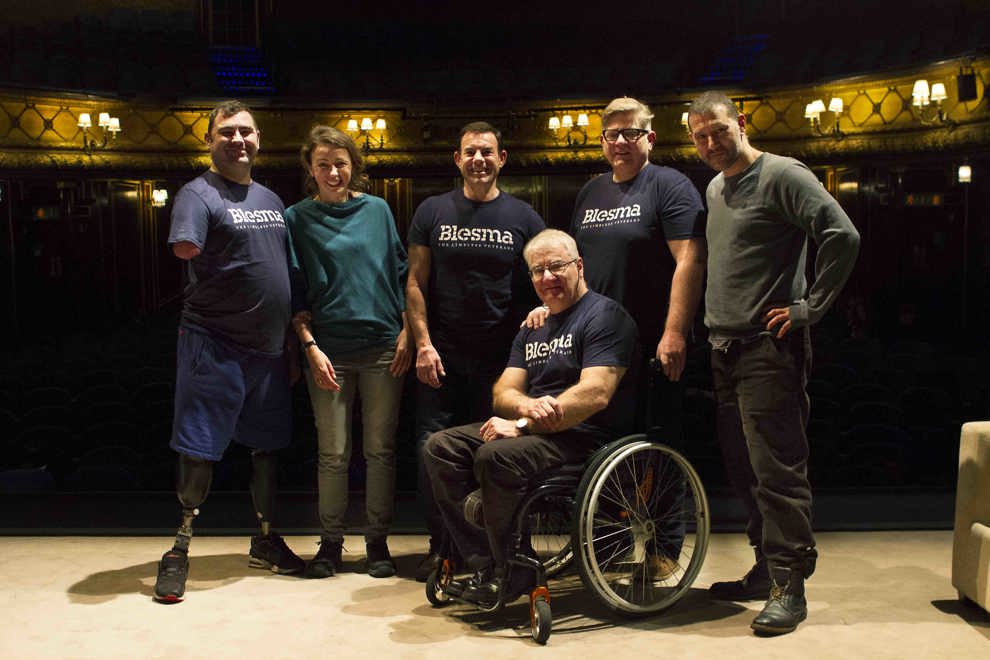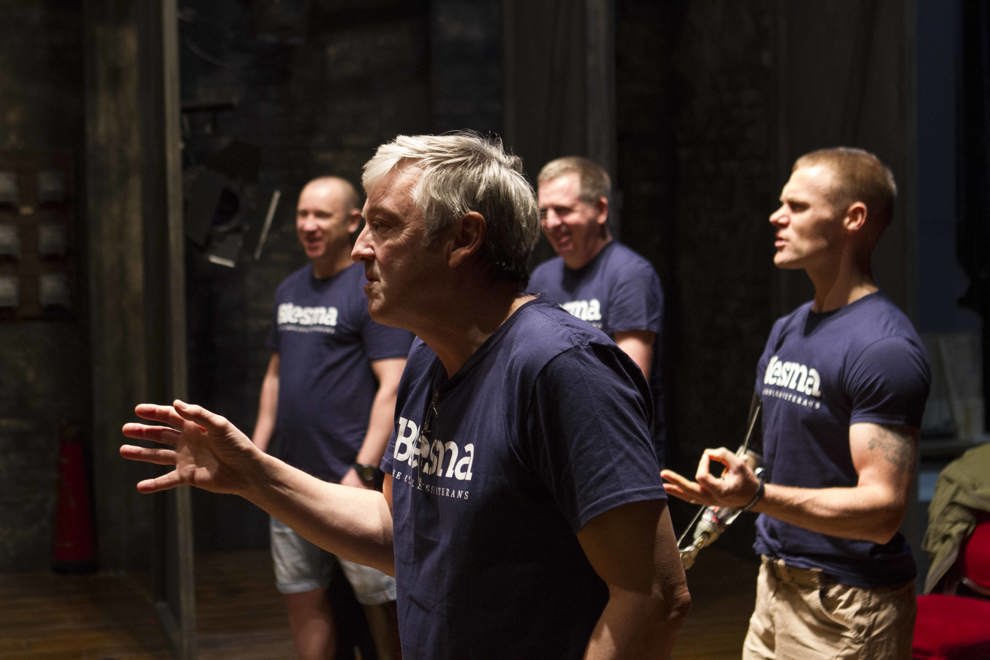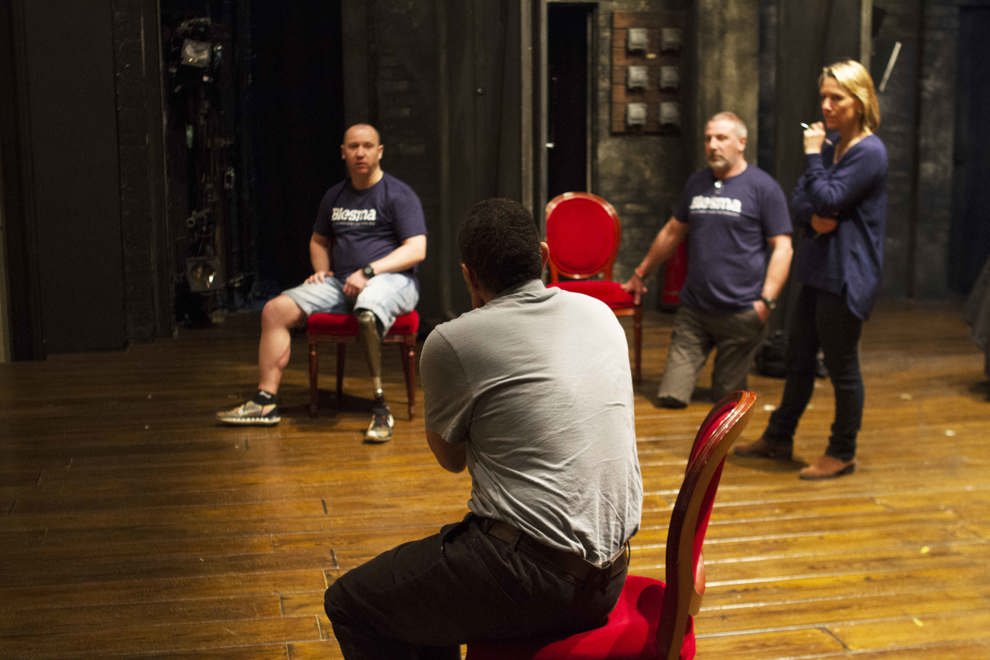Archie Naughton is standing centre stage in one of the most impressive theatres in London’s West End. The Blesma Member is in full flow as he stands under the Noel Coward Theatre’s main spotlight.
“In 1976, I was injured in a car crash when the vehicle I was travelling in careered into a ditch,” he begins. “I recovered but then, later that Summer, a military helicopter I was flying in came off the flight deck, completely out of control, and crashed into the sea. I was underwater, strapped into the seat, but somehow managed to get out. Then, something bad happened…” Archie smiles and the audience laughs right on cue. It’s a great piece of drama, typical of the humour and storytelling verve that many Blesma Members already have. But Archie is taking talking to the next level, learning to hone his story as part of the Blesma Community Programme; an ambitious new scheme that teaches Members to tell their personal stories of disaster and triumph in the most engaging way possible.
Over a six-day training course, participants learn how to narrate a gripping monologue from professional theatre directors. Once their training is complete, the Members will go out into the community to deliver their story of overcoming adversity to teenagers. The students will then explore any themes and issues that come up in a workshop designed to tie in with the Personal, Social and Health Education elements of the national curriculum. It is a great example of Blesma reaching out to communities and making a very real difference to the lives of others.
The Association has partnered with The Drive Project to target pupils on the verge of exclusion, and even though the programme is just starting out, results suggest that the impact could be enormous. “This group of 15 Members is the second to take part in the training course, and we’ve already been into a number of schools with graduates from the first course,” explains Programme Director Alice Driver. “The response has been amazing; one Member, Andy Reid, was told by a teacher he’d get 10 minutes out of the class before they’d get bored. He was still talking to them two hours later! Our aim is to motivate 1,000 pupils, and we already have 40 schools lined up. The impact could be huge – it could inspire a generation!”
Making individual stories incredible

Theatre directors Kate Beales and Al Nedjari, along with professional storyteller Clare Murphy, work with the Members to develop their communication skills. First, there are warm-up exercises; stretching and shouting is followed by some invisible ribbon twirling! Then it’s time for the work to begin. Stu Pearson, part of the group of soldiers whose story inspired the film Kajaki, steps forward and recounts the events that led to him being blown up and losing a leg. He tells of his anger as a request for a helicopter is denied. It’s a moving moment, but Al makes it even more effective. “You’ve got a great professional detachment from the events you’re describing,” he says, “but you need to pause more, and draw us into certain moments so we live the story.” Kate stands next to Stu, showing him some moves that will help improve his body language.
The second run-through is much more striking. Darren Swift was involved in this scheme’s pilot programme early last year. He is now a professional actor who has starred in a number of plays, including Blue On Blue, which has recently finished a run on the West End. He tells the audience about the moment he first saw himself in the mirror after both his legs were amputated. “I thought; ‘You’re a mess!’ But I knew I had a choice. I could put my chin on my chest and go into a black hole, or hold my chin up and get on with life.” He’s clearly good, but the directors get him to slow down to reinforce the drama.
The impact could be huge – it could inspire a generation!

The same is true of Archie Naughton, whose delivery is brilliantly comic despite the “something bad” turning out to be the shredding of his right leg by a car. “A nurse told me I was going into shock,” he says. “I thought that was nonsense, but all I could say was ‘NRRRGH!’ That’s when I realised she was probably right.” Again, Kate feels he needs more pauses, but this time it’s so that people can enjoy the laughs. Triple amputee Mark Ormrod’s narration is perfectly pitched. “Those 45 minutes were the most frightening I’ve ever experienced,” he says of kneeling on an IED. “They involved me picking my own foot off the floor, falling out of a vehicle as I was being evacuated, and being declared clinically dead in the back of a helicopter – only to be revived three minutes later.”
The directors can’t believe how much his delivery has progressed since the first time he told the story, and they work on his breathing between sentences. Carole King tells the story of her tough childhood growing up in a Hull orphanage. Her harrowing delivery affects everyone, but the tutors help her intensify her story even more by telling her to make more eye contact with the audience. Last up is Pat Provis, who has lost an arm, as well as three fingers and a thumb on the other hand. He delivers a great turn about being given a book called The Soldier as a boy and thinking; ‘I’m having some of that.’ The directors get him to speak louder and move less.
“It’s going really well,” says Programme Director Alice halfway through the performances. “The Members are learning great skills including public speaking, how to deliver a workshop, class management and storytelling techniques. This scheme will also give them paid employment and will really enhance their CVs. Running this part of the course in the West End (the Young Vic and Theatre Royal Haymarket theatres have also been kind enough to host similar sessions) gives a real sense of excitement, and the performances get better because of the theatres’ atmosphere.”
Looking forward to being on stage at @youngvictheatre and #NoelCowardTheatre tomorrow! @blesma #adaptandachieve pic.twitter.com/FFpcii6Spm
— The Drive Project (@thedriveproj) March 23, 2016
The Members themselves, meanwhile, are amazed at how much they’ve learned. “This has been the best thing I’ve ever done with Blesma,” says Pat. “I spoke to the Welsh Assembly earlier this year about prosthetics, but I did it from an A4 sheet. This is much better. What I’ve been taught has been incredible. I’m Really looking forward to engaging with the teenagers. If we can inspire them, it’ll be so worthwhile. It’s also helped me learn how to tell a story better, which is fantastic, because I’m currently writing a book.”
Archie Naughton agrees. “My story has changed so much since I started the course; it has expanded and developed. The techniques we’ve learned, the breathing and dramatic pauses, have really made a huge difference. You make vast improvements every day and feel much more confident... and standing on a London stage was a simply wonderful experience.” Mark Ormrod can’t wait to use his new-found skills in a practical way. “I think we all feel the same – the end result should be incredible,” he says. “It’s about contributing and giving back. It becomes important to do some good with a bad situation. I’ve developed so much over the week. I’ve done some public speaking and you get into a routine, thinking; ‘If it isn’t broken, don’t fix it.’ But these guys have definitely fixed it!”
Carole King adds; “What I find interesting is the way the tutors have helped us all realise that we have a story to tell. Blesma Members don’t like to big themselves up, but the tutors have shown us that what we might think is rambling can actually be incredibly striking. I don’t think I’ll be nervous doing the real thing. I’ll be able to address a group of teenagers and hopefully help them out.”
The critics give five star reviews

Even the tutors, who are all well used to working with professional thespians, have been blown away by the Members and their commitment. “They have great poise, posture and readiness, but what impresses me most is their compassion,” says Kate. “Those qualities may not be immediately obvious, but under the surface it holds them together. And, of course, they have great material.” Five star reviews all round, then. Teenagers across the UK will soon be reaping the benefits. If you are interested in taking part in a future training course, or know an organisation that could benefit from the workshop, contact bcp@blesma.org
When Members complete the course they will take their story out into the community. Then, they’ll follow their talk up with a workshop that explores the theme of overcoming adversity. “Pupils will learn from the struggles the Members have gone through, and apply them to their own lives,” says Programme Director Alice Driver. “In Personal, Social and Health Education, there is a focus on overcoming adversity to achieve goals. We are delivering the real deal by asking these guys to talk.”
Theatre director Kate Beales sees other benefits, too.“The workshops will help to show students the complexity of life. They are often taught in terms of black and white, right and wrong. Blesma Members show that you can be scared and vulnerable, but also brave and dynamic at the same time. It’s a complexity that kids often don’t get taught, and I think it Pat Provis will be really useful for them.”
Secondary Schools that are interested in a free workshop please click here
We can help
We are dedicated to assisting serving and ex-Service men and women who have suffered life-changing limb loss or the use of a limb, an eye or sight. We support these men and women in their communities throughout the UK. Click the link below to find out the different kinds of support we offer.
Get Support
Leave a comment
Join fellow Members and supporters to exchange information, advice and tips. Before commenting please read our terms of use for commenting on articles.